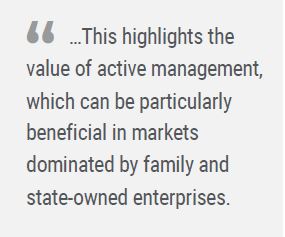
Louis Lau is a Director, Investments Group, a Senior Analyst on the Financial Institutions Team and a member of the Emerging Markets Investment Committee. He is also a Product Coordinator for the Emerging Markets Portfolio. Mr. Lau is a limited partner of the firm’s parent company. Before joining Brandes, he was an Analyst in investment banking and equity capital markets at Goldman Sachs. He earned his BBA in finance (with merit) from the National University of Singapore and his MBA in finance and accounting (with honors) from the Wharton School of the University of Pennsylvania. Mr. Lau is fluent in Chinese. His relevant experience began in 1998 and he joined Brandes Investment Partners in 2004.
Louis Lau sheds light on the potential in emerging markets given the heightened attention to inflation and interest rates. He delves into market forces shaping manufacturing and consumer companies in China, and the near- to medium-term outlook for the country. Louis also provides insight into the Brandes Emerging Markets Investment Committee's selection criteria and the value approach to emerging markets Brandes has employed for almost three decades. He has 26 years of investment experience and has been with Brandes since 2004.
The current market focus on inflation and interest rates has led to a cautious approach towards emerging markets and their currencies. However, this sentiment may present an opportunity for investors to reevaluate emerging markets. Setting aside broad economic forecasts, a closer examination at the industry and country levels reveals several positive drivers in our emerging markets portfolio. For example, we believe the banks and financial companies we own have resilient margins and earnings despite changes in the interest rate environment. It's important to note that the monetary policies of emerging market central banks do not mirror the Federal Reserve’s, and each country exhibits unique economic dynamics. The banks either exhibit strong growth potential, fueled by ongoing financial penetration in regions such as India, Indonesia, and the Philippines, or are delivering substantial returns to shareholders through dividends and share buybacks. The Mexican entities in our portfolio are reaping the advantages of nearshoring trends. This refers to the strategic relocation of businesses to Mexico, which offers reduced production costs and proximity to the North and South American markets. Despite the presence of short-term macroeconomic volatility, we maintain a positive outlook on the fundamental investment case for our portfolio holdings.

Let me break down our portfolio holdings in China into roughly two categories. The first category comprises companies that are tied to China's competitiveness in manufacturing, which includes electric vehicle-battery manufacturers and home appliances. These firms are thriving, capturing market share internationally, and reaping the benefits of domestic replacement demand. Vigilance is warranted concerning potential policy shifts by the U.S. and Europe aimed at curbing the penetration of Chinese goods into their markets, which could provoke reciprocal measures affecting U.S. and European businesses in China. In anticipation of possible tariff escalations, Chinese companies are strategically relocating production outside of China and closer to consumer bases as well as expanding their market presence outside of the U.S. and Europe.
The second category comprises consumer companies, which have been performing reasonably well at the operational level. Despite this, market sentiment towards these companies has been tempered by concerns over the real estate downturn and deflationary pressures. However, indicators such as the rebound in international travel from China, increased visitation to Macao, and steady sportswear sales suggest a positive trajectory toward pre-COVID levels. This trend supports the long-term potential of these consumer-driven businesses.
Regarding China-Taiwan relations, we've seen several high-level exchanges taking place between U.S. and Chinese officials. We think these meetings could have helped to defuse tensions and may reduce the risk of conflict in the near and medium term.

Brazil stands out due to our significant allocations. The country's attractiveness stems from favorable macroeconomic conditions, including fiscal discipline and effective inflation management. Additionally, Brazil's current valuations are notably lower relative to its historical averages. We have found value in several sectors in Brazil, including aviation, energy, utilities, and communication services.
Currently, we are focusing on several critical factors in the emerging market opportunity set. A significant issue affecting the performance of emerging market equities is the suboptimal capital allocation by companies in these markets. At Brandes, we pay close attention to corporate governance, and give preference to companies with management teams that prioritize shareholder interests, both in terms of capital investment and returns. This highlights the value of active management, which can be particularly beneficial in markets dominated by family and state-owned enterprises.
Another crucial factor is macroeconomic stability. In certain emerging or frontier markets, it is essential to assess whether the company-specific investment case and strength of the business could offset some of the macroeconomic headwinds. If not, it may be prudent to minimize investment in such companies or avoid them altogether.
At Brandes, the heart of value investing lies in the detection of mispricing at the company level. This is characterized by an attractive gap between the current stock price and our estimate of intrinsic value, otherwise known as the margin of safety. Such undervaluation may stem from various elements, such as the market's disregard for a cyclical downturn or its underestimation of a firm's potential for capital returns or earnings growth. In that regard, emerging markets offer a distinctly diverse and rich universe. We are proud to have been investing in emerging markets for nearly three decades, and we look forward to continuing our commitment to applying our value investing framework to emerging markets.
